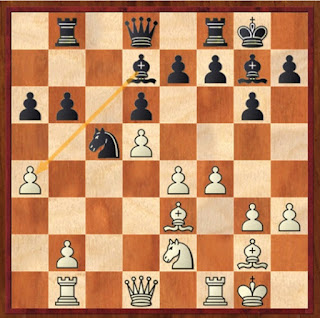I was at the Heah Joo Seang Hall past 11 o'clock on Sunday morning. Intention was to attend the opening minutes of the Penang Chess Association's annual general meeting. Had been invited by the president. However, I found that the meeting was already over. It had been held the day before, on Saturday. "I've lost on time," I texted the president. "Oops," she replied, and then adding after a while, "Sorry, my bad." She had misinformed me. The AGM was supposed to be on Saturday but she told me Sunday.
Never mind, I said. At least, the ninth and final round of the mini Penang open chess tournament was still going on. But it being the final round, most of the games had already concluded. Walking around the hall to look at the remaining games, I was impressed by the game on the fourth table between Wong Jianwen and Li Bo. Wong is a local player from Kuala Lumpur while Li is an international master from China, a rather eccentric character if I may add, and this was his
[Event "2nd Mini Penang Chess Open 2019"]
[Site "St Xavier's High School, Penang, Malaysia"]
[Date "2019.06.09"]
[Round "9"]
[Board "4"]
[White "Wong, Jianwen"]
[Black "Li, Bo"]
[Result "1-0"]
[ECO "A36"]
[WhiteElo "2287"]
[BlackElo "2330"]
[PlyCount "149"]
[EventDate "2019.06.05"]
[EventRounds "9"]
[EventCountry "MAS"]
1. c4 Nf6 2. g3 g6 3. Bg2 Bg7 4. Nc3 O-O 5. e4 c5 6. Nge2 Nc6 7. d3 d6 8. O-O a6 9. h3 Rb8 10. a4 Ne8 11. Be3 Nc7 12. d4 cxd4 13. Nxd4 Ne6 14. Nde2 Nc5 15. Rb1 Nb4 16. f4 b6 17. Nd5 Nxd5 18. cxd5 Bd7 (see first diagram)
When I began watching this game, this position had just been reached. Li was attacking the a4-pawn with his bishop and knight, and Wong could have played 19 b3 to protect it. But no, he coolly ignored the threat and brought his knight to a central position. Would his opponent take the bait? Apparently, yes. Here is the continuation of the game:
19. Nd4 Bxa4 20. b3 Bd7 21. b4 Na4 22. Qd3 b5 23. Rfc1 Rc8 24. Nc6 Bxc6 25. dxc6 Nb2 26. Qb3 Nc4 27. Rxc4 bxc4 28. Qxc4 Qc7 29. e5 dxe5 30. Qxa6 (see second diagram)
Connected passed pawns on the queenside, pair of double bishops, how can Wong lose? He didn't, he didn't lose. But Li was a stubborn fella, full of resistance. Somehow to his credit, he managed to convert the game into an opposite-coloured bishops ending. Drawn in most cases but this game was far from being drawn. The pair of unhindered passed pawns on the queenside could still tilt the balance in Wong's favour. At the end, Li refused to accept the inevitable loss and continued playing the game until checkmate.
30...exf4 31. gxf4 Qd6 32. Qc4 e5 33. b5 exf4 34. Bc5 Qf6 35. Bxf8 Bxf8 36. Rf1 Qe5 37. Qxf4 Bc5+ 38. Kh1 Qxf4 39. Rxf4 f5 40. Rc4 Be3 41. Rc3 Bb6 42. Ra3 Rb8 43. Ra6 Bd8 44. Ra7 Bb6 (44...Rxb5? 45. c7 wins) 45. Rd7 Kh8 46. Bf1 Ba5 47. Kg2 Bb6 48. Kf3 g5 49. Bd3 Rd8 50. Bxf5 Rxd7 51. cxd7 Kg7 52. Ke4 Kf6 53. Kd5 Kxf5 54. Kc6 Ke6 55. Kxb6 Kxd7 56. Ka7 h5 57. b6 g4 58. hxg4 hxg4 59. b7 g3 60. b8=Q g2 61. Qh2 g1=B+ 62. Qxg1 Ke6 63. Qd4 Kf5 64. Qe3 Kf6 65. Qe4 Kg5 66. Qf3 Kg6 67. Qf4 Kg7 68. Qf5 Kh8 69. Qg5 Kh7 70. Kb7 Kh8 71. Kc7 Kh7 72. Kd7 Kh8 73. Ke7 Kh7 74. Kf7 Kh8 75. Qg7# 1-0



No comments:
Post a Comment